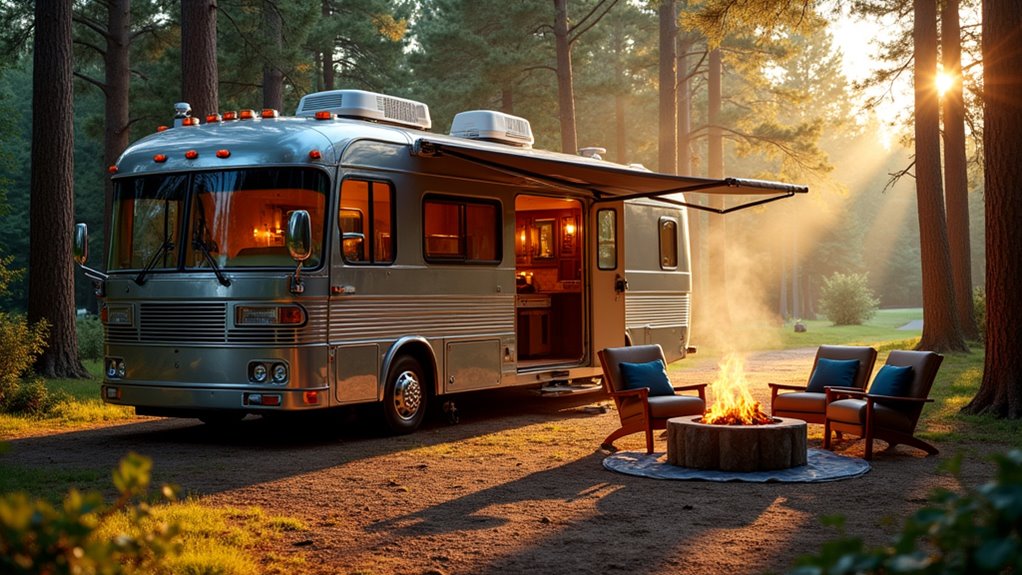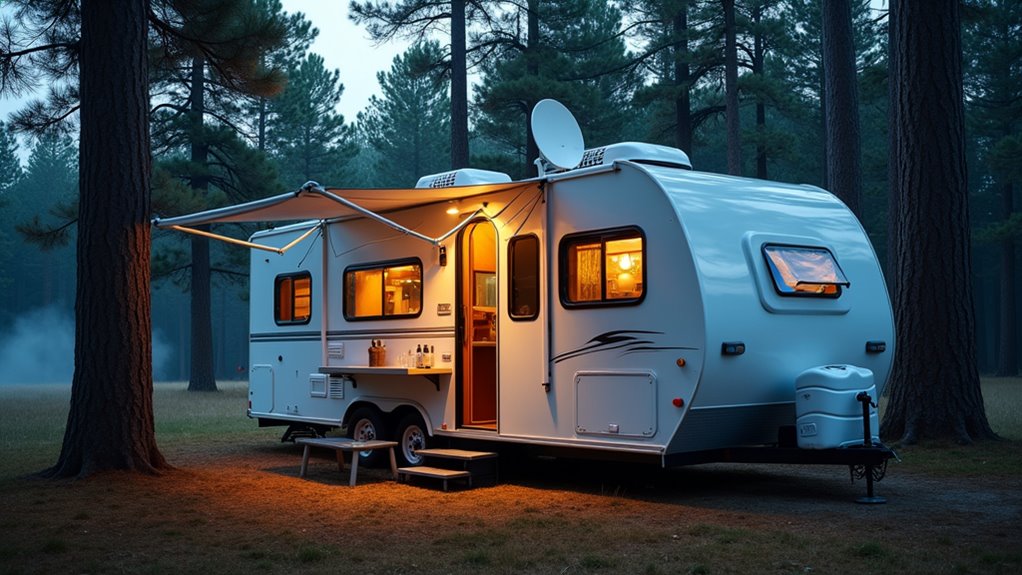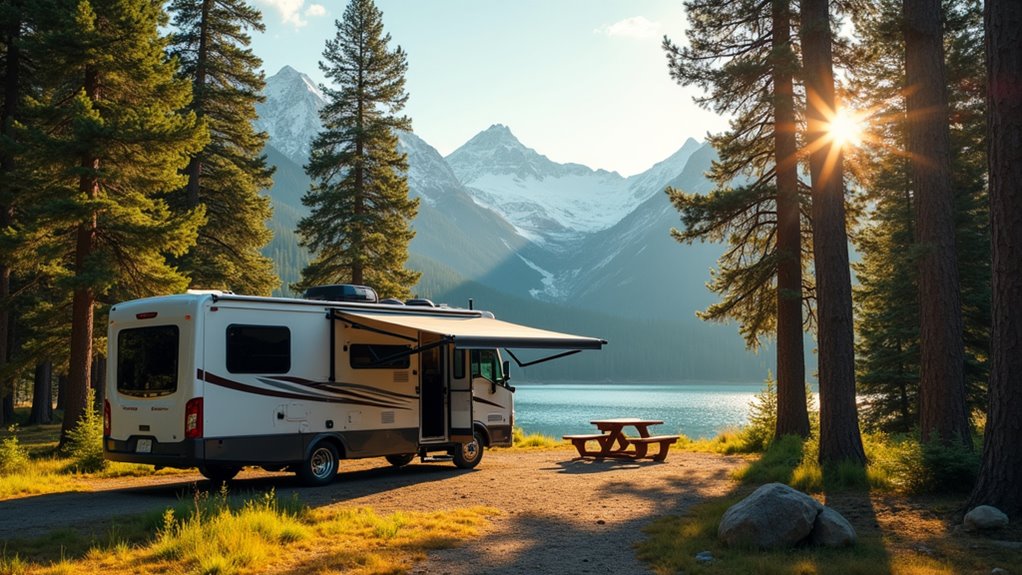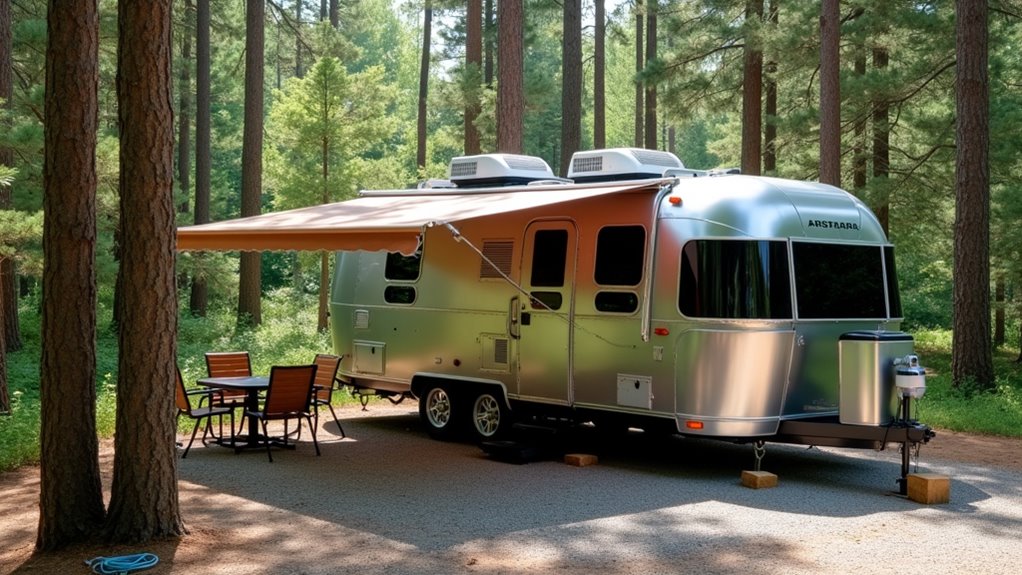Physical Address
304 North Cardinal St.
Dorchester Center, MA 02124
Physical Address
304 North Cardinal St.
Dorchester Center, MA 02124

Not ready to sacrifice comfort for nature's beauty? RV camping offers the perfect compromise between outdoor adventure and modern conveniences.
Does the thought of sleeping on the ground and hauling water from a distant spigot make your back ache before you’ve even left home? You’re not alone in craving nature without the physical punishment that often comes with traditional camping. RV camping bridges that gap perfectly, letting you wake up to mountain views while your coffee brews in your own kitchen. But choosing the right setup can make or break your outdoor experience, and there’s more to contemplate than you might think.

While traditional camping purists might scoff at the idea, RV camping offers the perfect compromise between outdoor adventure and creature comforts that won’t break your budget. You’ll sleep on a real mattress instead of the ground, cook meals in a proper kitchen, and use an actual bathroom whenever nature calls.
There’s no wrestling with tent stakes in the rain or hauling coolers filled with melting ice.
You’re still experiencing nature – hiking trails, watching sunsets, and breathing fresh air – but you’ve got climate control and electricity when you need them. RV camping lets you explore remote locations while maintaining the conveniences that make your trip enjoyable rather than endurance-testing. When comparing RV versus tent camping options, the choice often comes down to your personal preferences for comfort and convenience. It’s adventure without the suffering.
Before you start browsing RV lots or rental websites, you’ll need to understand the three main categories that’ll determine both your camping experience and your wallet’s fate.
Class A motorhomes are luxury hotels on wheels, offering spacious living but guzzling gas and requiring serious driving skills. They’re pricey to buy and maintain.
Class B campervans provide compact efficiency – think converted vans with basic amenities. They’re easier to drive and park but offer minimal space for families.
Class C motorhomes hit the sweet spot between comfort and manageability. Built on truck chassis with overhead sleeping areas, they’re more affordable than Class A while offering better amenities than Class B.
Travel trailers require a tow vehicle but cost less upfront and let you unhitch for day trips around camp.
When making your decision, consider which RV type aligns best with your camping frequency, budget constraints, and comfort requirements.

Once you’ve picked your RV type, you’ll discover that certain amenities separate miserable camping from comfortable adventures. Prioritize reliable electrical systems with sufficient battery power and a quality inverter for off-grid camping. A functional freshwater system with adequate tank capacity keeps you hydrated and clean without constant refills.
The difference between RV misery and comfort lies in prioritizing essential systems like reliable power and adequate water capacity.
Don’t overlook climate control—whether it’s air conditioning for scorching summers or efficient heating for chilly nights. Proper insulation conserves energy and money.
Kitchen essentials like a two-burner stove, compact refrigerator, and microwave transform meal prep from tedious to enjoyable. When selecting camping cookware for your RV kitchen, consider lightweight, multi-purpose pieces that maximize functionality while minimizing storage space.
Comfortable sleeping arrangements matter more than you’d think. Invest in quality mattresses and adequate storage solutions.
Finally, ensure you’ve got reliable lighting throughout your RV—LED fixtures consume less power while providing excellent illumination for evening activities.
After selecting your RV and ensuring it’s equipped with essential amenities, your first camping adventure requires strategic planning to avoid costly mistakes and frustrating surprises.
Start by choosing beginner-friendly campgrounds with full hookups and nearby facilities. Book reservations well ahead, especially during peak seasons, as popular spots fill quickly.
Create a detailed packing checklist covering food, clothing, tools, and emergency supplies. Don’t overpack – you’ll learn what’s actually necessary through experience.
Plan your route carefully, considering your RV’s size and weight restrictions. Some bridges and roads aren’t RV-friendly.
Set a realistic budget including campground fees, fuel, food, and unexpected expenses. Pack extra cash for emergencies.
Test all your RV systems before departing, and keep your first trip short and close to home.
If you don’t own an RV yet, renting an RV allows you to experience this camping style without the significant upfront investment of purchasing.

Now that you’re ready to hit the road, America offers incredible RV destinations that won’t break your budget while delivering unforgettable experiences. Great Smoky Mountains National Park provides free entry and stunning scenery, while nearby campgrounds offer affordable rates.
Arizona’s desert landscapes around Quartzsite attract thousands of RVers each winter with low-cost camping options.
Florida’s state parks welcome RVers year-round with reasonable fees and full hookups. Don’t overlook South Dakota’s Black Hills region – you’ll find budget-friendly campgrounds near Mount Rushmore and Badlands National Park.
Texas state parks offer excellent value with clean facilities and diverse landscapes. For beach lovers, Oregon’s coast provides spectacular oceanfront RV sites at state parks.
Research state park systems – they’re typically your best bet for quality amenities without premium prices. If you’re considering extending your RV adventures into colder months, winter camping requires additional preparation but opens up unique opportunities for solitude and snow-covered landscapes.
While hotel rooms can cost $100-200 per night, you’ll typically spend just $20-50 for RV camping at most destinations. That’s immediate savings of $80-150 per night, adding up to hundreds or thousands over a week-long trip.
You’ll also cut dining expenses dramatically. Instead of restaurant meals at $15-30 per person, you can cook in your RV kitchen for $5-10 per meal. A family of four saves roughly $40-80 daily on food alone.
Don’t forget the hidden hotel costs: parking fees, resort charges, and overpriced snacks. RV camping eliminates these extras.
Plus, you’re investing in equipment you’ll use repeatedly, unlike single-use hotel stays. Your RV becomes a long-term asset that pays for itself after several trips.
For the truly adventurous seeking unique experiences, RV camping provides access to remote areas like glacier climbing trails that traditional accommodations simply can’t reach.

Before you hit the road, establishing a solid maintenance routine will save you from costly breakdowns and dangerous situations miles from home. Check your tires monthly – worn treads or low pressure can cause blowouts. Test your brakes before every trip, especially if you’re towing. Keep your engine fluids topped off and replace filters regularly.
Safety-wise, install smoke and carbon monoxide detectors if your RV doesn’t have them. Pack a well-stocked first aid kit and learn basic troubleshooting for your electrical and plumbing systems. You’ll avoid expensive service calls at remote locations.
Create a pre-trip checklist covering lights, hitch connections, and slide-outs. Don’t forget to secure loose items inside – they become projectiles during sudden stops. Regular maintenance costs far less than emergency repairs. When venturing out for day hikes from your campsite, pack a hiking bag with essential items to ensure you’re prepared for any outdoor adventure.
Even experienced outdoors enthusiasts stumble when they first switch to RV camping because the learning curve’s steeper than expected. You’ll likely overpack initially—remember, weight matters for fuel economy and handling. Don’t skip the pre-trip walkthrough; check tire pressure, fluid levels, and ensure everything’s secured inside before hitting the road.
Even seasoned outdoor veterans face a surprisingly steep learning curve when making the jump to RV camping adventures.
Rookie campers often forget to level their RV properly, causing cabinet doors to swing open and affecting appliance performance. Always carry leveling blocks.
Another costly mistake? Ignoring your freshwater tank capacity and black water limits. Monitor these closely to avoid expensive pump-out fees or messy situations.
Finally, don’t assume every campground has hookups. Research amenities beforehand and pack accordingly. These simple precautions save money and prevent frustrating situations that’ll dampen your outdoor adventure.
If you’re planning water activities during your RV trip, consider whether renting or buying a boat makes more financial sense for your camping adventures.
You’ve survived tent camping horror stories, wrestled with soggy sleeping bags, and pretended lukewarm beans from a can taste “authentic.” Now you’re ready to embrace your inner glamper without shame. Your friends might mock your “luxury camping,” but they’ll be begging for invitations once they see your hot shower and freshly brewed coffee. Who’s laughing now when you’re watching Netflix while they’re still trying to start their campfire?